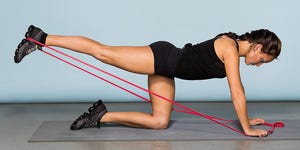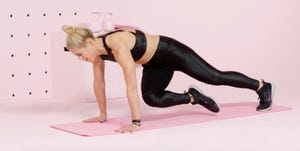- The sumo deadlift is a deadlift variation that helps you lift more weight.
- This move also targets slightly different areas of your glutes.
- You can incorporate the sumo deadlift into your leg day workout routine.
Traditional deadlifts are like black coffee—they work miracles without any fuss. But sometimes you need a little something more—an extra kick of caffeine, a little boost of flavor—so you opt for a latte or an Americano.
Well, with deadlifts, if you want to pull more weight or work different parts of your glutes, you go sumo, says San Diego-based exercise physiologist Pete McCall, C.S.C.S.
How To Do A Sumo Deadlift
How to: Stand with feet shoulder-width apart (a little wider if you prefer), with a set of dumbbells in front of you. Rotate your feet away from the midline of your body so they’re turned out 30 to 45 degrees. Bend at the hips, keeping your chest up and driving your hips back as you reach your hands down to grab the dumbbells with an overhand grip. Take a deep breath and engage your core. Keep your spine straight as you squeeze your glutes, thrust your hips forward and raise the dumbbells as you straighten your legs to stand. Slowly lower the weights back to the floor. That’s one rep.
Sumo deadlifts make it easier to lift heavier weights.
Reps/sets for best results: The position of sumo squats allows you to pull heavier (more on that in a sec), so aim for 5 to 8 reps where you’re fatiguing by the last one. Rest 90 seconds. Start with 2 sets and work your way up to 4 over time, McCall advises.
Note: You can also perform this move with a barbell or kettlebell.
Benefits Of Sumo Deadlift
Just like traditional deadlifts, the sumo variety is primarily a strength move, although it can also help improve hip mobility, McCall says.



The primary perk of a sumo deadlift over the regular kind is it makes it easier to lift heavier weights. “Turning your feet out and grabbing [the weight] under your center of gravity shortens the lever length between your hands and hips, where all the power is generated,” he explains. “This reduces the load and allows you to pull more weight.”
Both variations strengthen the same muscles: glute maximus, hamstrings, adductors (all those responsible for extending the hips). But because your feet are pointed outward, the external rotation of the hips helps target different angles of the glutes’ muscle fibers, helping them develop even more as a whole, McCall adds.
Make Sumo Deadlifts Part Of Your Workout
In the bigger picture of a workout routine, traditional deadlifts are still an ideal go-to. But since sumos develop your glutes differently and let you lift more, it can be helpful to switch to this variety for 6 to 10 weeks, McCall says.
Incorporate them into any leg day workout—up to three times a week.
Because glutes exercises use up a lot of energy, execute the move toward the beginning of your workout, when your muscles are strongest, McCall says. Sumos work the back of your legs, so, if you do a superset, pair it with a move that targets your quads and other muscles along the front of your thigh—like goblet, front, or squats.
Source: Read Full Article
